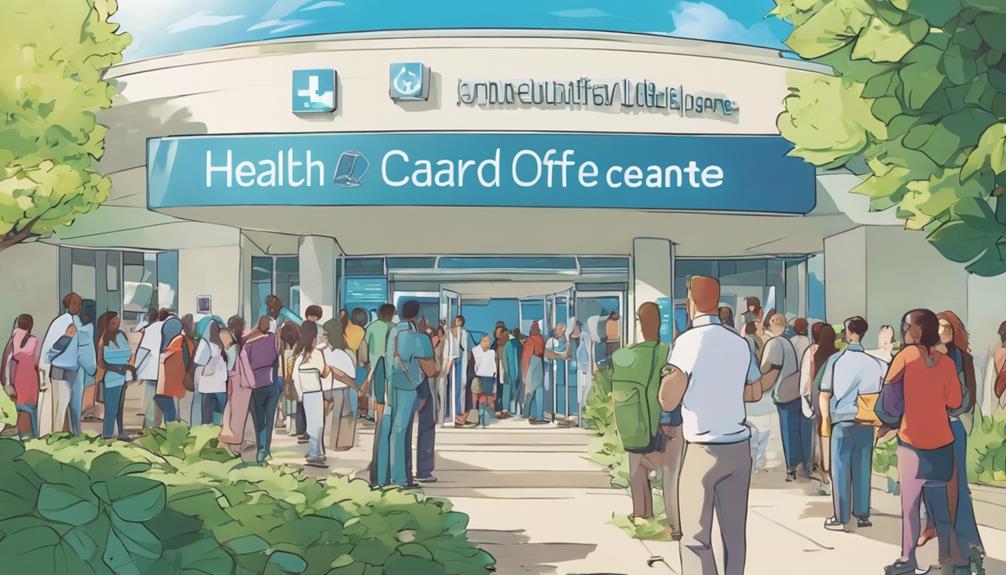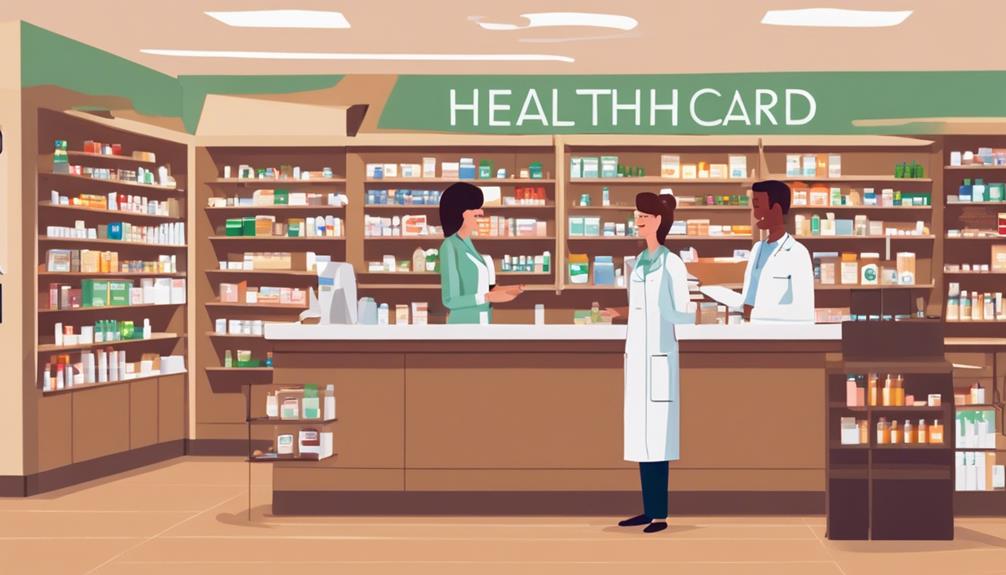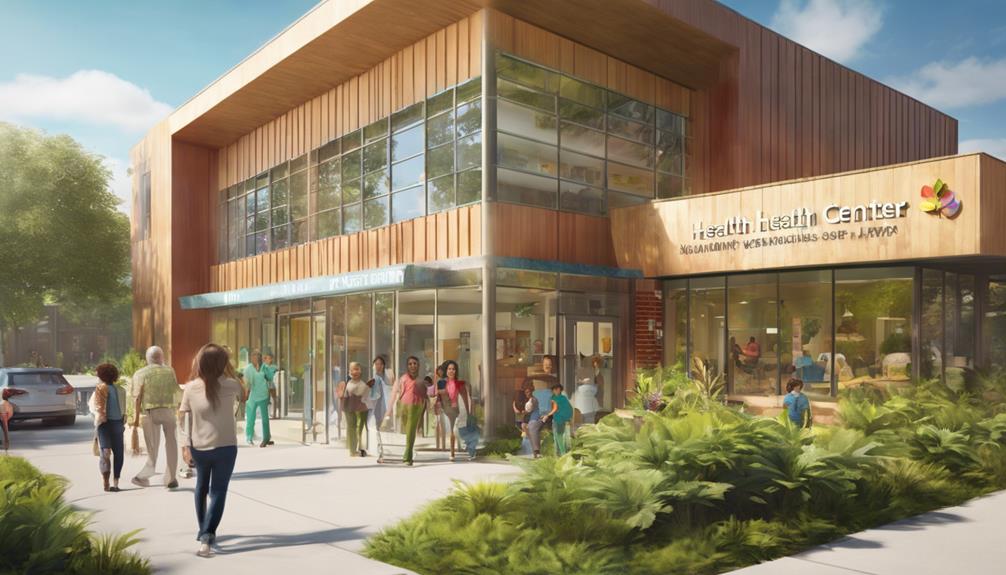You can get a health card through various local options. Start by visiting your local government office, where you'll find assistance with eligibility and required documents. Community health centers also offer support in the application process. Many hospitals and clinics have trained staff to guide you in obtaining your card. If you prefer convenience, check official government websites for online application options. Additionally, non-profit organizations can help connect you with resources in your area. Exploring these avenues will guarantee you understand your options better, leading to access to essential health benefits.
Local Government Offices

You can typically obtain your health card at local government offices, where they handle the application process and provide necessary information. To start, you'll need to meet specific eligibility requirements, which may vary by location. Generally, these requirements include proof of residency and income.Where Was Yoga Started
Once you confirm your eligibility, you can begin the application process. This usually involves filling out a form and submitting supporting documents. Expect to provide identification, proof of income, and possibly health-related documents.
After submitting your application, the local government office performs document verification. This step guarantees that all provided information is accurate and meets the program's criteria. Depending on your location, this verification process may take some time, so plan accordingly.
Once approved, your health card will grant you access to various health services and benefits. These benefits can include low-cost or free medical care, preventive services, and prescription assistance.
Having a health card can greatly reduce your healthcare expenses, making it an essential resource for maintaining your well-being. Remember to keep your health card updated to continue enjoying these benefits.
Community Health Centers
Community health centers serve as essential resources for obtaining health cards, offering support and guidance throughout the application process. These centers are committed to community outreach, ensuring that everyone has access to necessary health services. They often provide information about eligibility requirements, the application process, and necessary documentation, making it easier for you to navigate these steps.
In addition to helping you secure a health card, community health centers emphasize health education. They host workshops, provide informational materials, and engage with local residents to promote awareness about health services available in your area. This proactive approach not only helps you understand the importance of having a health card but also encourages preventative care and healthy lifestyle choices.
When you visit a community health center, you'll find compassionate staff ready to assist you. They understand the barriers many face in accessing healthcare and work diligently to reduce these challenges.
Hospitals and Clinics

Hospitals and clinics also play an essential role in helping individuals secure health cards, often providing on-site assistance and resources for the application process. When you visit a hospital or clinic, you can typically find staff trained to guide you through the steps required to determine your health card eligibility. They can help you gather necessary documents and fill out the application forms correctly.
Many facilities have designated departments or personnel who specialize in health services, making it easier for you to access the information you need. If you're unsure about what documents are required or whether you meet the eligibility criteria, don't hesitate to ask. The staff can clarify any doubts and guarantee you're prepared for the application process.
Additionally, some hospitals may offer workshops or informational sessions that provide detailed guidance on securing a health card. Utilizing these resources can save you time and reduce the stress associated with the application process.
Online Application Options
When applying for a health card online, you've got two main options: official government websites and third-party services.
Official sites often provide the most secure and up-to-date information, while third-party services may offer convenience and additional support.
Choosing the right option can streamline your application process and guarantee you receive your health card promptly.
Official Government Websites
To streamline your application for a health card, you can visit the official government websites that offer online submission options. These sites are designed to make the application process straightforward and efficient. You'll find thorough information about health card eligibility, making sure you meet all necessary criteria before submitting your application.
Once you access the relevant website, look for the section dedicated to health card applications. Here, you'll find step-by-step instructions to guide you through the application process. Most government websites provide user-friendly interfaces, allowing you to complete your application quickly.
Don't forget to gather all necessary documents before you start. This can include identification, proof of residency, and any specific information related to your health card eligibility. Submitting an incomplete application can cause delays, so make sure everything is in order.
After submitting your application online, you should receive confirmation, along with details on how to check its status. Utilizing official government websites not only saves time but also guarantees your application is processed correctly, leading to a smoother experience in obtaining your health card.
Third-Party Services
Many people find that third-party services offer convenient online application options for obtaining a health card. These services simplify the process, allowing you to apply from the comfort of your home. By using third-party assistance, you can quickly determine your health card eligibility and receive guidance throughout the application process.
When you choose a reputable third-party service, you often gain access to user-friendly platforms that streamline your application. They typically provide checklists and tips to guarantee you have all necessary documentation, reducing the chances of delays. Additionally, many services offer real-time updates, so you can track the status of your application.
It's important to research and select a trustworthy provider, as some may charge fees for their services. However, the convenience and support offered can be invaluable, especially if you're unfamiliar with the application process.
Pharmacy Services

Pharmacy services are essential for managing your health, providing everything from medication dispensing to consultations on drug interactions. When you visit a pharmacy, you'll find that pharmacists aren't just dispensers of medicine; they're knowledgeable professionals ready to assist you with medication management. They can help you understand your prescriptions, ensuring you're taking the right doses at the right times.
Additionally, many pharmacies offer pharmacy discounts, making it easier for you to afford your medications. These discounts can considerably reduce out-of-pocket expenses, especially for those on long-term medications. Don't hesitate to ask about any available programs or savings plans when you visit.
Pharmacists can also help you avoid potential drug interactions by reviewing your medication list. They're trained to spot issues that could affect your health, providing recommendations that keep you safe and informed.
Utilizing pharmacy services not only empowers you with knowledge about your medications but also enhances your overall health management. So next time you need a refill or have questions, remember that your pharmacist is a valuable resource in your healthcare journey.
Non-Profit Organizations
Non-profit organizations play a significant role in providing access to health cards and other essential services for individuals in need, often bridging gaps where traditional healthcare systems fall short. These organizations typically focus on community health, making it easier for you to obtain a health card without the complexities often associated with private providers.
Through various outreach programs, non-profits actively connect with underserved populations, ensuring that everyone has the opportunity to receive health education and resources. They often host workshops, seminars, and events that not only inform you about the importance of health cards but also guide you on how to apply for them.
You'll find that many non-profit organizations collaborate with local clinics and health departments to facilitate the application process. They're committed to reducing barriers, whether financial or informational, that might prevent you from accessing the healthcare you deserve.
If you're looking for assistance, reach out to these organizations in your area. They can provide not just health cards but also invaluable support and guidance, empowering you to take charge of your health and well-being.
Health Insurance Providers

When it comes to choosing a health insurance provider, you have several options.
Major health insurers offer extensive plans, while local insurance agents can provide personalized assistance.
Additionally, online enrollment options make it easy to compare plans and find the coverage that fits your needs.
Major Health Insurers
Explore the leading health insurers that offer a range of plans tailored to your needs. Understanding the major health insurance providers can help you make informed decisions about your coverage. Each insurer has unique premium costs and coverage options, so it's crucial to compare them.
Blue Cross Blue Shield is known for its extensive network and variety of plans, catering to different budgets and health needs.
UnitedHealthcare offers thorough coverage and additional wellness programs to help you stay healthy.
Aetna focuses on preventive care, providing affordable plans that prioritize your well-being.
Cigna is another strong contender, known for its global reach and customer service, often featuring plans that cover a wide array of services.
When evaluating these insurers, consider not just the premium costs but also what services are included in your plan.
Look for coverage options that align with your personal health requirements.
Local Insurance Agents
Local insurance agents play an essential role in helping you navigate the myriad of health insurance options available from major providers. They understand the local market trends that can affect your coverage choices and premiums. As you look for a health card, these agents can provide personalized advice tailored to your specific needs and circumstances.
Insurance agent roles include evaluating your healthcare requirements, explaining policy details, and comparing different plans. They're not just salespeople; they're your advocates in the often-complex world of health insurance. By leveraging their local expertise, they can help you find plans that provide the best value for your budget while ensuring you get the coverage you need.
Working with an insurance agent often means gaining access to exclusive deals and promotions that you mightn't find online. Plus, they can assist you in understanding the nuances of each plan, such as deductibles, co-pays, and network restrictions.
Ultimately, engaging with a local insurance agent can simplify your search for a health card, making the process more efficient and less overwhelming. Don't hesitate to reach out to them for guidance in your health insurance journey.
Online Enrollment Options
Online enrollment options with health insurance providers streamline the process of obtaining a health card, allowing you to compare plans and complete applications from the comfort of your home. Many providers offer user-friendly websites where you can input your information, review various coverage options, and select a plan that suits your needs.
When enrolling online, you can often find extensive information about benefits, including telehealth services. These services enable you to consult healthcare professionals remotely, ensuring you receive care without the hassle of traveling. This is especially beneficial for preventive care, helping you stay on top of your health with routine check-ups and screenings.
Additionally, most health insurance websites provide tools to estimate costs and out-of-pocket expenses, making it easier for you to budget for healthcare. Once you've selected a plan, completing the enrollment process is typically quick and efficient. You'll receive your health card via mail shortly after, allowing you to access your benefits almost immediately.
Conclusion
To sum up, obtaining a health card is accessible through various local resources.
Whether you visit government offices, community health centers, or hospitals, there are multiple avenues to explore.
You can also consider online applications or seek assistance from pharmacies and non-profit organizations.
Don't forget to check with your health insurance provider for additional options.
By utilizing these resources, you'll be well on your way to securing the health card you need for your well-being.
